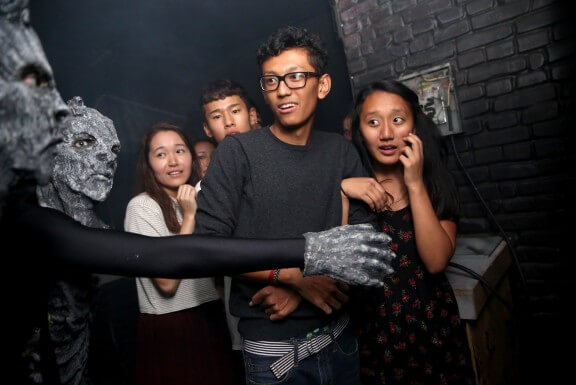 Rosamund Pike visited the New York Film Festival for the premiere of her new film, “Gone Girl.”
Rosamund Pike visited the New York Film Festival for the premiere of her new film, “Gone Girl.”
Credit: Getty Images
When it came to casting “Gone Girl”’s male lead — Nick Dunne, a man alternately hated and loved — it was a no-brainer: Ben Affleck. Amy, his missing, mysterious wife, was a little trickier. They wisely went with Rosamund Pike, the English actress of “Pride & Prejudice,” “An Education” and “Jack Reacher.” But we can’t talk about a fair amount of her performance for fear of mid-film spoilers. Luckily there’s lots about “Gone Girl” to discuss.
Her experience with Flynn’s novel: “I hadn’t read it. I had my son just before it came out, so that gives you about six months underground without exposure to what’s going on in the world.”
Flynn’s portrayal of courtship: “To me it seems to be about how you can construct an honest relationship in an age where everyone’s trying to perform to get a mate. There’s this idea of women playing ‘the cool girl’: a slightly altered version of themselves that suits the people they’re trying to attract. That was shocking and new. I think people had a sort of guilty identification with it.”
Amy’s issues: “Amy is someone who has very high expectations — high expectations engendered by her peculiar upbringing. Her parents have created this character, Amazing Amy, based on her, who’s a girl for whom everything falls in her lap — this fictional twin who succeeds whenever she slips up. It’s given Amy a very fragile sense of who she is and a sense of entitlement. She takes that with her into a relationship.”
On Amy and Nick: “Nick Dunne is probably not the perfect match for her. He can be the perfect match. He is equally nonspecific in a way. He’s able to perform and be amazingly charming and compelling, but is equally a shlub who doesn’t take his boxers off all day and plays video games. And that is not the guy Amy wants to be married to.”
What “Gone Girl” says about marriage: “There’s a point in marriage where you can decide not to accept all parts of yourself, to only express some of yourself. Amy subscribes to that. You bury the parts of you that are lacking and you decide you should always be a high-wattage, dashing version of yourself — which is of course an unsustainable ideal.”
 Rosamund Pike plays the missing, mysterious Amy in “Gone Girl.”
Rosamund Pike plays the missing, mysterious Amy in “Gone Girl.”
Credit: Merrick Morton
What it says about today: “It’s in a climate where everyone is so aware of how they come across. People speak to each other on Skype, so they’re not only having a telephone conversation, they’re suddenly maybe not picking their teeth because someone can see them. Everyone is so much more self-aware than they were 50 years ago. You’re always having to be aware of yourself from the outside, which is a recipe for narcissism. Even if you’re not actually lying, even if there are photos of you, they’re edited versions. You’re choosing the best images, the best angles. I’ve spoken to journalists who have pictures next to their columns. And they look nothing like their photos. The photo was honestly taken 15 years ago, from an advantageous angle.”
On Fincher’s notorious habit for many takes: “I do respond to why people are so interested in the takes, as though it was some punishment for the actors. In every job you’re working under deadline, and if someone says, ‘Take the weekend, you can put it in Monday,’ it’s a gift. You get more time. That’s how David spends his production budget. He pares down his crew and spends the money on having ample time to explore a scene in detail. He understands not only the technical side of film, but he knows just how to build characters with actors. That’s why I feel all his scenes are so dense and accomplish so much — because we had the time to pin down the layers of the scenes. It’s a wonderful way to work. I think the more interesting question is for directors who do few takes. Do people ask Clint Eastwood why he only does two or three? Do they ask him as much as they ask David why he does 35? It was fun. Generally I’d sooner be doing what I love rather than sitting around on the side of the stage eating chocolate brownies and peanuts — although I had to do that at some point to play Amy at different weights.”
On shifting weight: “It’s a schizophrenic experience, in the loosest possible term. I try to be psychologically accurate. But you’re either on a perpetual sugar high or feeling rather hungry. It was weight gain, weight loss, weight gain. We were either preparing to go back up or preparing to come back down.”
Follow Matt Prigge on Twitter @mattprigge
















